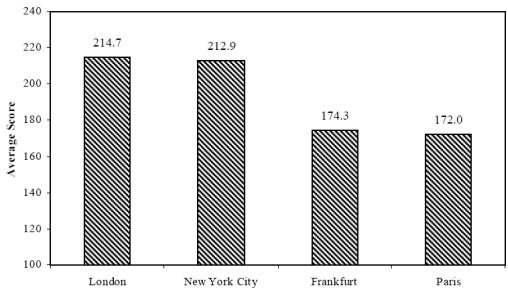London And New York Emerge As Clear Leaders
Monday, 07 November 2005By Now&ZYen
7 November 2005
Today (Monday 07 November) sees the release of a new report, The Competitive Position of London as a Global Financial Centre, which gives a fascinating insight into global financial centres and how London ranks among them.
Commissioned by the Corporation of London and conducted by Z/Yen Limited, the research is based on a survey of opinion of professionals in the financial services industry in over 20 countries.
Senior decision makers were asked about the key components of competitive advantage, and how the world’s major financial centres ranked against these criteria.
Michael Snyder, Chairman, Policy and Resources Committee, Corporation of London said “I believe the key findings of this report are clear: London and New York have emerged as the clear leaders in the ranking of global financial centres.”
Average Scores of the Financial Centres

- London and New York are the only two genuinely global financial centres at present. Respondents believe that other financial centres such as Frankfurt, Paris and most of the Asian centres will remain as national financial centres and will not challenge London and New York as global financial centres in the future.
- The difference between London and New York is not statistically significant. What is clear, however, is that these two financial centres have extended their lead over Frankfurt and Paris since 2003.1
Other findings of the report include:
- The five most important competitive factors for financial centres in descending order are:
- The availability of skilled personnel;
- The regulatory environment;
- Access to international financial markets;
- Availability of business infrastructure;
- Access to customers.
Competitive Factors Ranked
| Factor of Competitiveness | Rank | Average Score |
|---|---|---|
| Availability of Skilled Personnel | 1 | 5.37 |
| Regulatory Environment | 2 | 5.16 |
| Access to International Finance Markets | 3 | 5.08 |
| Availability of Business Infrastructure | 4 | 5.01 |
| Access to Customers | 5 | 4.90 |
| A Fair and Just Business Environment | 6 | 4.67 |
| Government Responsiveness | 7 | 4.61 |
| Corporate Tax Regime | 8 | 4.47 |
| Operational Costs | 9 | 4.38 |
| Access to Suppliers of Professional Services | 10 | 4.33 |
| Quality of Life | 11 | 4.30 |
| Cultural & Language | 12 | 4.28 |
| Quality / Availability of Commercial Property | 13 | 4.04 |
| Personal Tax Regime | 14 | 3.89 |
- The availability of skilled personnel is clearly judged as the most important factor with over 90% of respondents judging it to be either ‘Very Important’ or ‘Critically Important’.
- The regulatory environment is also seen as a crucial component of competitiveness. These two factors also ranked first and second in the 2003 study. London and New York scored highly for both these factors and this contributed to their overall rankings.
- None of the recipients believe that London or New York will lose their positions as global financial centres within the next ten years.
- Part of the continuing appeal of London to foreign companies is its cosmopolitan status. Frankfurt and Tokyo, for example, are primarily market places for domestic participants to which foreign players are granted access. London, and to a lesser extent, New York are characterised by foreigners trading with each other. In an increasingly international economy, London seems to have a solid future as a global financial centre.
- An argument has been made that financial centres will be weakened by technology, outsourcing and off-shoring. The research indicates that financial centres may lose certain types of commoditised activities to low cost cities although important parts of the industry, companies’ headquarters and their most skilled employees, will continue to cluster in financial centres. ‘Value-added’ activities will remain in the business clusters that financial centres offer. These value added activities include senior ‘strategic’ management and front office, product innovation, client facing and deal-making activities.
- Views on a third global financial centre are split. Most people agree that if a third global financial centre develops it is most likely to be in China and probably in Shanghai. It is unlikely that Hong Kong, Singapore or Tokyo will ever become more than regional financial centres.
- The main competitive factors that keep London and New York so strong are the availability of skilled people and the regulatory environment. However, the reason that these cities became global financial centres in the first place has something to do with their long trading history. These two cities have critical mass and benefit from having an existing business cluster.
Mark Yeandle of Z/Yen Limited commented:
“Global financial centres have emerged where market liquidity is. Market liquidity is very hard to move and so once a centre such as London has been established it will take a number of significant factors, acting over a long period to alter the status quo.”
To download the report, click here.
ENDS
For further information, please contact either Fiona Milligan, Corporation of London
Telephone: 020 7332 3451
Mobile: 07900 244 200
Email: fiona.milligan@cityoflondon.gov.uk
or Mark Yeandle, Z/Yen
Telephone: 020 7562-9562
Email: mark_yeandle@zyen.com.
1 In June 2003 the Corporation of London published Sizing up the City – London’s Ranking as a Financial Centre, a report written by the Centre for the Study of Financial Innovation based on a survey of City opinion of London’s competitive position as an international financial services centre.
Z/Yen specialises in risk/reward management, an innovative approach to improving organisational performance. Z/Yen’s clients include blue chip companies in banking, technology and professional services as well as charities, government and care organisations (see www.zyen.com).